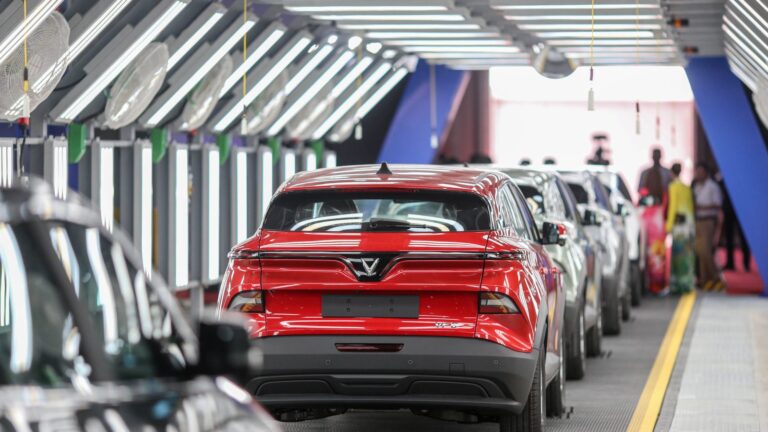China is questioning India’s electric vehicle subsidies on the global stage.
The world’s largest EV producer, China has requested the World Trade Organization to settle a dispute with India over incentive schemes, which it claims discriminate against Chinese goods, according to a communication released by the Geneva-based intergovernmental body on October 20.
In its complaint dated October 15, Beijing had challenged three of India’s production-linked incentives, or PLIs. China claims they are “contingent upon the use of domestic over imported goods or that otherwise discriminate against goods of Chinese origin.”
The dispute pits China’s need for new markets against India’s push to build its own EV industry.
China is making more EVs than it can sell at home, and Western countries are blocking Chinese imports with higher tariffs. India’s market has become crucial for Chinese EV makers seeking new buyers. At the same time, India is trying to break into an industry where China controls almost 80% of global production.
The first two of the production-linked incentives, both from 2021, affect the manufacturers of EV batteries, components, and original equipment. The third, introduced in March 2024, slashes import duties on fully built passenger EVs from 110% to 15% for cars priced above $35,000, capped at 80,000 units annually.
The Indian government is using the scheme to attract the likes of Tesla while keeping Chinese players ineligible. As India cannot build its domestic EV sector without China’s help, it is maintaining a selective approach. Rather than placing blanket restrictions, it is blocking some investments while allowing strategic partnerships.
Big-ticket projects like BYD’s $ 1 billion plant have been rejected, while battery-maker CATL is reportedly partnering with Indian conglomerate Adani Group to enter India — all in the interest of a fledgling domestic industry.
Indian policymakers say the subsidies are meant to favour Indian manufacturing, not discriminate against foreign firms.
Rest of World spoke to experts on the legitimacy of China’s complaint, the necessity of intervention between the two countries, and the long-term impact of this mediation. The responses have been edited for brevity.
De-risking from China
Salman Waris, founding partner at Indian tech law firm TechLegis
“India might be able to counter China’s claim by asserting that these are performance-based incentives, not outright bans, and align with WTO-allowed development flexibilities for emerging markets.
A win here for China could limit localization mandates worldwide, stabilizing chains reliant on Chinese batteries — critical for 70% of global EVs — and benefiting exporters like CATL or LG.
However, if India prevails, citing Article XVIII for infant industries, it greenlights similar policies in Brazil, Indonesia, or Africa — accelerating ‘de-risking’ from China and boosting diversified sourcing, such as India’s lithium deals with Argentina.”
Industrial policy, not free trade
Bill Russo, founder and CEO of Shanghai-based advisory firm Automobility Ltd
“China’s complaint has legal merit. India’s EV incentives clearly favor domestic content, which runs counter to WTO rules prohibiting such discrimination. This isn’t just a trade dispute — it’s another front in the global race to localize EV supply chains and reduce strategic dependence on China.
Even if China wins at the WTO, it won’t reopen markets. Both countries are doubling down on self-reliance in critical technologies. Industrial policy, not free trade, is now shaping the future of the EV industry, and this case highlights how fragmented the global supply chain has become. This is less about legal process and more about signaling — a reminder that the EV transition is as much about geopolitics as it is about technology.”
Energy security and self-sufficiency
Ravi Gadepalli, founder of mobility advisory firm Transit Intelligence
“The PLI scheme for EVs has been in the works since 2021 and is a well-thought-through program. E-mobility is top priority for the government [for] India’s energy security and emission mitigation targets.
During the Covid-19 pandemic, we have witnessed how several e-bus orders were delayed due to supply chain issues during the pandemic. The government is within its rights to ensure energy security by promoting local manufacturing and ensuring self-sufficiency to the extent possible for such a critical policy priority.
The government did not prohibit trade with China for all EV manufacturers. They have only limited it for the firms receiving incentives from the government.”
Implications for several countries
Srividya Jandhyal, associate professor at France’s ESSEC Business School and author of The Great Disruption: How Geopolitics is Changing Companies, Managers, and Work
“If India’s measures are to ultimately be ruled as violating the WTO terms, it might have implications for several countries. This is because many countries have adopted policies to support domestic companies over foreign ones.
There are also several measures that support firms from friendly over rival countries — and not just in batteries, auto components, and electric cars.”
Pre-climate economy era rulebook
Sunil Kansal, head of consulting and valuation at U.K.-based Shasat Consulting
“The timing of the complaint, just as India’s EV industry begins to scale, suggests that China may be leveraging the WTO process as a strategic instrument rather than seeking immediate corrective action.
This case could set an important precedent for the global EV supply chain. As more countries adopt localization and clean-technology incentives, the intersection of industrial policy and trade law is becoming increasingly complex. It may even prompt the WTO to modernize its rulebook, one that was written for a pre-climate economy era.
India is not an outlier in promoting domestic EV manufacturing; it is part of a global movement towards cleaner, self-reliant, and technologically advanced economies. The world’s trade regime must evolve to accommodate climate imperatives rather than penalize them. In that sense, India’s position is not just defensible, it is forward-looking, balanced, and necessary for sustainable growth.”
Images are for reference only.Images and contents gathered automatic from google or 3rd party sources.All rights on the images and contents are with their legal original owners.

